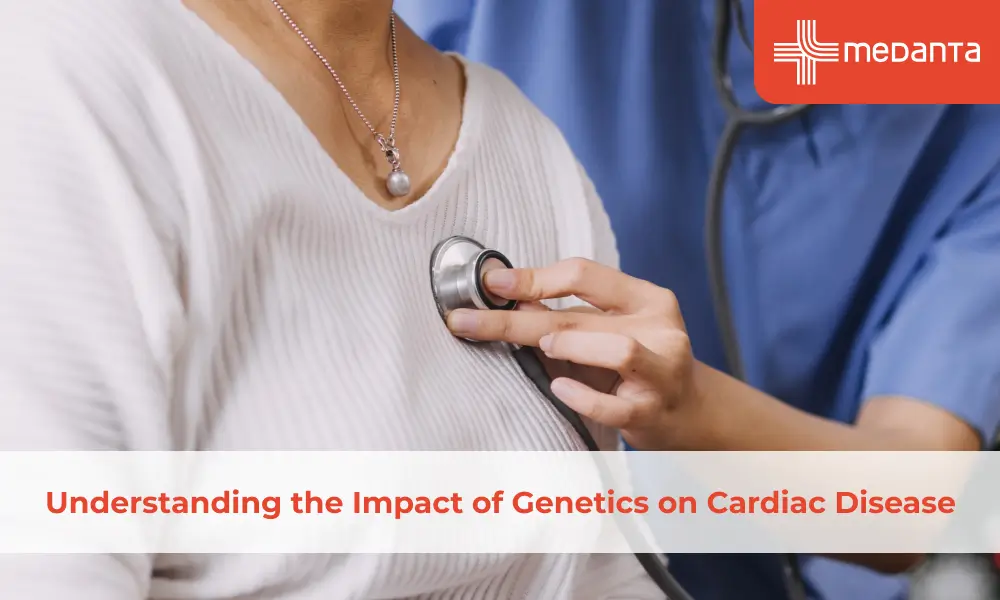Understanding the Impact of Genetics on Cardiac Disease

TABLE OF CONTENTS
Cardiac disease, often categorised as cardiovascular disease, majorly contributes to the death rate across the world. Now that cardiac disease is a highly heritable trait, many researchers have conducted studies to understand the relationship between heart disease and genetics for the past few years. It’s because discovering all genetic factors contributing to cardiac diseases can pave the way for personalised medicine and more effective therapeutic strategies.
In this article, we will explore how genetics can impact cardiac disease, types of genetic heart disease, diagnosis methods, and how to prevent it.
Genetic Cardiac Disease: What is It and How Does Genetics Cause it?
Genetic cardiac disease is a heart condition that is passed to any patient through his family’s genetic makeup. Affected people have cardiac genetics conditions from birth, which occur due to abnormalities in their genes.
So, how does genetics cause cardiac disease?
Mutated or faulty genes are responsible for causing cardiac disease. The human genome entails around 20,000 to 25,000 different genes. A fault or mutation in one or more of your genes can impact your body and health, sometimes causing genetic cardiac disease. Genetic factors in heart disease can affect the structure and function of your heart, blood vessels, and the body's ability to regulate blood pressure and cholesterol levels.
In case your parents had cardiac disease-causing mutated genes, there’s a 50% possibility for you to have the same.
What are the Common Genetic Cardiac Disease?
Genetic predisposition to heart disease, a hereditary condition caused by the presence of certain genetic variants, can increase your chances of developing the following cardiac diseases:
Cardiomyopathy: It’s caused by mutations in genes that encode your heart muscle’s proteins. This genetic condition is characterised by enlarged, thick, or rigid heart muscle that affects its ability to pump blood smoothly and, thus, increases the risk of sudden cardiac death.
Familial Hypercholesterolemia: In this genetic disorder, your cholesterol levels, particularly low-density lipoprotein (LDL) cholesterol, increase. Due to this condition, people can develop the risk of coronary artery disease at a young age.
Cardiac Amyloidosis: This is a cardiac genetics disorder where faulty proteins start building up in your heart.
Long QT Syndrome: This genetic condition affects your heart's electrical activity, raising the risk of irregular heartbeats (arrhythmias).
Herat Valve Disease: Certain mutations in your genes can damage or affect the functioning of one or more valves in your heart, affecting blood flow.
Marfan Syndrome: Marfan syndrome is a connective tissue disorder that affects your heart, blood vessels, and other organs. Caused by mutations in the FBN1 gene, this condition can lead to weakened blood vessel walls and increase the risk of aortic aneurysms.
Familial Thoracic Aortic Aneurysm Syndrome: Due to this genetic condition, you are more likely to have a bulge (aneurysm) in the upper part of your aorta.
Pulmonary Hypertension: This genetic cardiac ailment is characterised by high blood pressure in the arteries to your lungs, making it harder for your heart’s right side to work than usual
Knowing the Symptoms of Genetic Heart Disease
You might wonder how to determine whether genetic factors in heart disease. You can look for the following symptoms, and if you experience them, consider visiting your healthcare provider:
Chest pain
Heart palpitations
Shortness of breath
Fatigue
Lightheadedness
Diagnosing Genetic Cardiac Disease
Keeping an eye on the above-discussed symptoms is the initial approach to diagnosing whether you have genetic-related cardiac disease. However, some people with genetic cardiac disease might not show any signs at all. In such a case, your doctor might use the following diagnosis methods to identify whether you are at risk or have any cardiac genetics ailment:
Family History: Before starting with any other diagnosis procedure, your healthcare provider will review your family history to assess your risk of genetic cardiac condition. He will ask a few questions from your family members and close relatives about their cardiovascular disease history.
Physical Examination: Next, if you show any related symptoms, your doctor will ask you to undergo a physical examination.
Diagnostic Testing: Depending on your family history, symptoms, and physical exam result, your doctor might recommend some tests like MRI, CT scan, echocardiography, or cardiac catheterisation.
Genetic testing: Genetic testing involves analysing your DNA to find out specific mutations associated with conditions like familial hypercholesterolemia, hypertrophic cardiomyopathy, and long QT syndrome. However, not all patients can undergo genetic testing. It’s usually recommended for patients with a suspected or confirmed diagnosis of an inherited cardiac disease or the ones at high risk because of a previously identified ailment-causing variant in their family.
How Can Genetic Cardiac Disease Be Treated?
Although you can’t control your genetics, you can do the following things to reduce your risk or prevent cardiac disease:
Lifestyle Modifications: For individuals with a genetic predisposition to heart disease, lifestyle changes such as a heart-healthy diet, regular exercise, getting plenty of sleep, smoking and alcohol cessation, and avoiding excessive stress can help mitigate risk.
Medical Surveillance: You should regularly monitor your health through echocardiograms, stress tests, and cholesterol checks. Doing this can help detect early signs of cardiac disease, especially in genetically predisposed individuals.
Pharmacological Interventions: Based on the type and severity of your cardiac ailment, your doctor might prescribe some medications, such as statins, beta-blockers, and ACE inhibitors, to manage risk factors. Also, in case of severe health condition, your care team might recommend surgery to treat or prevent the progression of genetic cardiac disease.
To wrap it all up!
The impact of genetics on cardiac disease is profound and multifaceted, influencing everything from your risk of developing the ailment to the most effective treatment strategies.
Do you suspect having genetics-causing cardiovascular ailment? In such a case, consider reaching out to Medanta’s cardiology specialists for a better understanding of the relationship between heart disease and genetics. Also, they can perform accurate diagnoses and suggest a comprehensive treatment plan to help manage or treat your genetic heart disease.






